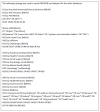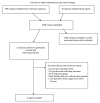Interventions for improving the psychosocial well-being of children affected by HIV and AIDS
- PMID: 19370650
- PMCID: PMC7387107
- DOI: 10.1002/14651858.CD006733.pub2
Interventions for improving the psychosocial well-being of children affected by HIV and AIDS
Abstract
Background: As a result of HIV-related mortalities more than 13 million children under the age of 15 have lost a parent due to HIV and AIDS. There are also many children who have HIV-positive parents or primary caregivers; these children are affected by HIV and AIDS and are potentially vulnerable to HIV transmission. Children affected by HIV and AIDS are more vulnerable and face greater challenges to their psychosocial well-being compared to other children of the same age. Interventions have been adopted with the aim of improving the psychosocial well-being of children affected by HIV and AIDS.
Objectives: The primary objective of this review was to assess the effectiveness of interventions that aim to improve the psychosocial well-being of children directly affected by HIV and AIDS.
Search strategy: Electronic databases were systematically searched using pre-defined search terms. Internet searches of relevant organizations involved in HIV and AIDS work were conducted and experts in the field and were contacted directly. Searches were conducted between January and September 2008.
Selection criteria: Randomised controlled trials, crossover trials, cluster-randomised trials and factorial trials were eligible for inclusion. If no controlled trials were found, data from well-designed non-randomised intervention studies (such as before and after studies), cohort, and case-control observational studies were considered for inclusion. Studies which included male and female children under the age of 18 years of age, either orphaned due to AIDS (one or more parents died of HIV related-illness or AIDS), or vulnerable children (one or more parents living with HIV or AIDS) were eligible for review.Interventions that aim to improve the psychosocial well-being of children affected by HIV and AIDS were included in the review. This included psychological therapy, psychosocial support and/or care, medical interventions and social interventions. Psychosocial outcomes were defined as any intervention that measures psychological and/or social factors.
Data collection and analysis: Two of the authors independently screened the results of the search. The full text of all potentially relevant studies were obtained and were independently assessed by the two reviewers using pre-determined criteria.
Main results: No studies of interventions for improving the psychosocial well-being of children affected by HIV and AIDS were identified.
Authors' conclusions: Current practice is based on anecdotal knowledge, descriptive studies and situational analyses. Such studies do not provide a strong evidence base for the effectiveness of these interventions.
Implications for research: This systematic review has identified the need for high quality intervention studies. In order to increase the quality and quantity of such studies there is a need for greater partnerships between program implementers and researchers.
Implications for practice: In the absence of rigorous intervention studies, the body of knowledge available consists of "lessons learned," child psychological theory and other related research in the adult population. However, such knowledge should not replace the urgent need for rigorous monitoring and evaluation of existing programs and intervention studies to ensure evidence-based practice and policy, and prevent subjecting children to interventions which show no benefit or interventions that could unintentionally lead to harm.
Conflict of interest statement
None known.
Figures
Update of
- doi: 10.1002/14651858.CD006733
Similar articles
-
Peer support interventions for parents and carers of children with complex needs.Cochrane Database Syst Rev. 2021 Dec 20;12(12):CD010618. doi: 10.1002/14651858.CD010618.pub2. Cochrane Database Syst Rev. 2021. PMID: 34923624 Free PMC article.
-
Systemic pharmacological treatments for chronic plaque psoriasis: a network meta-analysis.Cochrane Database Syst Rev. 2021 Apr 19;4(4):CD011535. doi: 10.1002/14651858.CD011535.pub4. Cochrane Database Syst Rev. 2021. Update in: Cochrane Database Syst Rev. 2022 May 23;5:CD011535. doi: 10.1002/14651858.CD011535.pub5. PMID: 33871055 Free PMC article. Updated.
-
Population-based interventions for reducing sexually transmitted infections, including HIV infection.Cochrane Database Syst Rev. 2004;(2):CD001220. doi: 10.1002/14651858.CD001220.pub2. Cochrane Database Syst Rev. 2004. Update in: Cochrane Database Syst Rev. 2011 Mar 16;(3):CD001220. doi: 10.1002/14651858.CD001220.pub3. PMID: 15106156 Updated.
-
Family-centred interventions for Indigenous early childhood well-being by primary healthcare services.Cochrane Database Syst Rev. 2022 Dec 13;12(12):CD012463. doi: 10.1002/14651858.CD012463.pub2. Cochrane Database Syst Rev. 2022. PMID: 36511823 Free PMC article.
-
Population-based interventions for reducing sexually transmitted infections, including HIV infection.Cochrane Database Syst Rev. 2001;(2):CD001220. doi: 10.1002/14651858.CD001220. Cochrane Database Syst Rev. 2001. Update in: Cochrane Database Syst Rev. 2004;(2):CD001220. doi: 10.1002/14651858.CD001220.pub2. PMID: 11405980 Updated.
Cited by
-
Cognitive and physical development in HIV-positive children in South Africa and Malawi: A community-based follow-up comparison study.Child Care Health Dev. 2018 Jan;44(1):89-98. doi: 10.1111/cch.12533. Epub 2017 Oct 19. Child Care Health Dev. 2018. PMID: 29047149 Free PMC article.
-
Changes in behavioral outcomes among children affected by HIV: Results of a randomized controlled trial in China.J Health Psychol. 2019 Sep;24(11):1581-1594. doi: 10.1177/1359105317746479. Epub 2017 Dec 15. J Health Psychol. 2019. PMID: 29243519 Free PMC article. Clinical Trial.
-
A cluster randomized controlled trial to evaluate a resilience-based intervention for caregivers of HIV-affected children in China.AIDS. 2019 Jun 1;33 Suppl 1(Suppl 1):S81-S91. doi: 10.1097/QAD.0000000000002181. AIDS. 2019. PMID: 31397726 Free PMC article. Clinical Trial.
-
Measuring Symptoms of Psychopathology in Zambian Orphans and Vulnerable Children: Scale Validation and Psychometric Evaluation.Assessment. 2020 Sep;27(6):1335-1348. doi: 10.1177/1073191118780455. Epub 2018 Jun 6. Assessment. 2020. PMID: 29871499 Free PMC article.
-
How Effective Is Help on the Doorstep? A Longitudinal Evaluation of Community-Based Organisation Support.PLoS One. 2016 Mar 11;11(3):e0151305. doi: 10.1371/journal.pone.0151305. eCollection 2016. PLoS One. 2016. PMID: 26967732 Free PMC article.
References
References to studies excluded from this review
Adejuyigbe 2006 {published data only}
-
- Adejuyigbe E, Odebiyi A. Parental HIV serodiscordance:implications for the care of the HIV seropositive child in a resource‐poor setting. AIDS Care 2006;18(6):537‐543. - PubMed
Beard 2005 {published data only}
-
- Beard B. Orphan care in Malawi: Current practices. J Community Health Nurs 2005;22(2):105‐115. - PubMed
Bhargava 2005 {published data only}
-
- Bhargava A. AIDS epidemic and the psychological well‐being and school participation of Ethiopian orphans. Psychol Health Med 2005;10(3):263‐275.
Brown 2007 {published data only}
-
- Brown L, Rice J, Boris N, Thurman T, Snider L, Ntaganira J, Nyirazinyoye L, Kalisa E, Nshizirungu E. Psychosocial benefits of a mentoring program for youth‐headed households in Rwanda. Horizons Research Summary 2007.
Dlamini 2004 {published data only}
-
- Dlamini P. A description of selected interventions for the care of orphans and vulnerable children in Botswana, South Africa and Zimbabwe. HSRC 2004.
Drew 1998 {published data only}
-
- Drew R, Makufa C, Foster G. Strategies for providing care and support to children orphaned by AIDS. AIDS Care 1998;1:S9‐S15. - PubMed
Gilborn 2001 {published data only}
-
- Gilborn L, Nyonyintono R, Kabumbuli R, Jagwe‐Wadda G. Making a difference for children affected by AIDS: baseline findings from operations research in Uganda. Population Council 2001.
Healthlink 2004 {published data only}
-
- Healthlink. A final evaluation of the project on child‐centered approaches to HIV and AIDS. Healthlink Worldwide 2004:1‐88.
Kayombo 2005 {published data only}
Kmita 2002 {published data only (unpublished sought but not used)}
-
- Kmita G, Baranska M, Niemiec T. Psychosocial intervention in the process of empowering families with children living with HIV/AIDS: A descriptive study. AIDS Care 2002;14(2):279‐284. - PubMed
Ohare 2005 {published data only}
-
- O'Hare B, Venables J, Naluberg F, Nakakeeto M, Kibirige M, Southall D. Home‐based care for orphaned children infected with HIV/AIDS in Uganda. AIDS Care 2005;17(4):443‐450. - PubMed
Additional references
Andrews 2006
-
- Andrews G, Skinner D, Zuma K. Epidemiology of health and vulnerability among orphaned and made vulnerable by HIV/AIDS in sub‐Saharan Africa. AIDS Care 2006;18(3):269‐276. - PubMed
Ansell 2004
-
- Ansell N, Young L. Enabling households to support successful migration of AIDS orphans in southern Africa. AIDS Care 2004;16(1):3‐10. - PubMed
Atwine 2005
-
- Atwine B, Cantor‐Graae E, Bajunirwe F. Psychological distress among AIDS orphans in rural Uganda. Soc Sci Med 2005;61:555‐564. - PubMed
Beard 2005
-
- Beard BJ. Orphan Care in Malawi: Current Practices. J Com Health Nur 2005;22(2):105‐115. - PubMed
Bhargava 2005
-
- Bhargava A. AIDS epidemic and the psychological well‐being and school participation of Ethiopian orphans. Psy Health Med 2005;10(3):263‐275.
Cochrane Collab 2006
-
- The Cochrane Collaborative Review Group on HIV infection and AIDS. Editorial Policy: Inclusion and Appraisal of Experimental and Non‐experimental (Observational) Studies. Online. http://www.igh.org/Cochrane 2006 Jul 4.
Drew 1998
-
- Drew RS, Makufa C, Foster G. Strategies for providing care and support to children orphaned by AIDS. AIDS Care 1998;10:Suppl 1: S9‐S15. - PubMed
Forsyth 1996
-
- Forsyth B, Damour L, Nagler S, Adnopoz J. The psychological effects of parental human immunodeficiency virus infection on uninfected children. Arch Paed Adolescent Med 1996;150:1015‐20. - PubMed
Foster 2002
-
- Foster G. Beyond education and food: psychosocial well‐being of orphans in Africa. Acta Paed 2002;91:502‐504. - PubMed
Foster 2005
-
- Foster G. Bottlenecks and Drip‐feeds: Channelling resources to communities responding to orphans and vulnerable children in Southern Africa. London: Save the Children UK, 2005.
Foster 2006
-
- Foster G. Children who live in communitees affected by AIDS. Lancet 2006;367:700‐01. - PubMed
Gilborn 2002
Gilborn 2006
-
- Gilborn L, Apicella L, Brakarsh J, Dube L, Jemison K, Kluckow M, Smith T, Snider L. Orphans and vulnerable youth in Bulawayo, Zimbabwe: An exploratory study of psychosocial well‐being and psychosocial support. Horizons Final Report 2006.
Gregson 2005
-
- Gregson S, Nyamukapa CA, Garnett GP, Wambe M, Lewis JC, Mason PR, Chandiwana SK, Anderson RM. HIV infection and reproductive health in teenage women orphaned and made vulnerable by AIDS in Zimbabwe. AIDS Care Oct 2005;12(7):785‐794. - PubMed
Horizons
-
- Horizons. Succession planning in Uganda: Early outreach for AIDS‐affected children and their families. Horizons Final Report 2004.
Howard 2006
Hunter 1990
-
- Hunter S. Orphans as a window on the AIDS epidemic in sub‐Saharan Africa: the initial results and implications of a study in Uganda. Soc Sci Med 1990;31:681‐90. - PubMed
Hunter 2000
-
- Hunter S, Williamson J. Children on the brink 2000 executive summary: Updated estimates and recommendations for intervention. Washington, DC: USAID, 2000.
Lee 2002
-
- Lee T, Foster G, Makufa C, Hinton S. Families, orphans and children under stress in Zimbabwe. Eval Prog Plan 2002;25:459‐470.
Makame 2002
-
- Makame V, Ani C, Grantham‐McGregor S. Psychological well‐being of orphans in Dar El Salaam, Tanzania. Acta Paed 2002;91:459‐65. - PubMed
Monasch 2004
-
- Monasch R, Boerma J. Orphanhood and childcare patterns in sub‐Saharan Africa: An analysis of nationalsurveys from 40 countries. AIDS 2004;18:S55‐S65. - PubMed
Nyambedha 2003
-
- Nyambedha E. O, Wandibba S, Aagaard‐Hansen J. Changing patterns of orphan care due to the HIV epidemic in western Kenya. 2003; Vol. 57:301‐311. - PubMed
Nyamukapa 2005
-
- Nyamukapa C, Gregson S. Extended family's and women's role in safeguarding orphans' education in AIDS‐afflicted rural Zimbabwe. Soc Sci Med 2005;60:2155‐2167. - PubMed
Ritcher 2006
-
- Ritcher L, Foster G, Sherr L. Where the heart is: Meeting the psychosocial needs of young children in the context of HIV/AIDS. The Hague, The Netherlands: Bernard van Leer Foundation, 2006.
Sengendo 1997
-
- Sengendo J, Nambi J. The psychological effect of orphanhood: a study of orphans in Rakai district. Health Transit Rev 1997;7(Suppl):105‐24. - PubMed
Strebel 2004
-
- Strebel A. The development, implementation and evaluation of interventions for the care of orphans and vulnerable children in Botswana, South Africa and Zimbabwe. Cape Town, South Africa: HRSC Publishers, 2004.
Subbarao 2004
-
- Subbarao K, Coury D. Reaching out to Africa's orphans:A framework for public action. Africa region Human Development Series 2004.
Thurman 2006
-
- Thurman TR, Brown L, Richter L, Maharaj P, Magnani R. Sexual risk behaviour among South African adolescents: is orphan status a factor?. AIDS Behav 2006;10(6):627‐35. - PubMed
UNAIDS 2006
-
- UNAIDS. Report on the global AIDS epidemic. 2006.
UNICEF 2003
-
- UNICEF. Africa's orphaned generation. 2003.
USAID 2002
-
- UNAIDS, UNICEF. Children on the brink 2002: A joint report on orphan estimates and programs strategies. USAID 2002.
Publication types
MeSH terms
LinkOut - more resources
Full Text Sources
Medical
Research Materials




